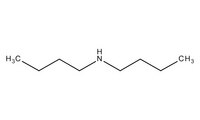803222 Sigma-AldrichDibutylamine
Dibutylamine for synthesis. CAS 111-92-2, chemical formula (CH₃CH₂CH₂CH₂)₂NH.
More>> Dibutylamine for synthesis. CAS 111-92-2, chemical formula (CH₃CH₂CH₂CH₂)₂NH. Less<<Synonyms: N-Butyl-1-butanamine
Recommended Products
Overview
| Replacement Information |
|---|
Key Spec Table
| CAS # | EC Number | Hill Formula | Chemical Formula | Molar Mass |
|---|---|---|---|---|
| 111-92-2 | 203-921-8 | C₈H₁₉N | (CH₃CH₂CH₂CH₂)₂NH | 129.24 g/mol |
Products
| Catalogue Number | Packaging | Qty/Pack | |
|---|---|---|---|
| 8.03222.0100 | Glass bottle | 100 ml | |
| 8.03222.1000 | Glass bottle | 1 l | |
| 8.03222.2500 | Glass bottle | 2.5 l |
| Description | |
|---|---|
| Catalogue Number | 803222 |
| Synonyms | N-Butyl-1-butanamine |
| Description | Dibutylamine |
| References |
|---|
| Product Information | |
|---|---|
| CAS number | 111-92-2 |
| EC index number | 612-049-00-0 |
| EC number | 203-921-8 |
| Hill Formula | C₈H₁₉N |
| Chemical formula | (CH₃CH₂CH₂CH₂)₂NH |
| Molar Mass | 129.24 g/mol |
| HS Code | 2921 19 39 |
| Structure formula Image | |
| Quality Level | MQ200 |
| Applications | |
|---|---|
| Application | Dibutylamine for synthesis. CAS 111-92-2, chemical formula (CH₃CH₂CH₂CH₂)₂NH. |
| Biological Information |
|---|
| Dimensions |
|---|
| Materials Information |
|---|
| Toxicological Information | |
|---|---|
| LD 50 oral | LD50 Rat 189 mg/kg |
| LD 50 dermal | LD50 Rabbit 770 mg/kg |
| Safety Information | |
|---|---|
| Categories of danger | flammable, harmful |
| Product Usage Statements |
|---|
| Storage and Shipping Information | |
|---|---|
| Storage | Store below +30°C. |
| Packaging Information |
|---|
| Supplemental Information |
|---|
| Specifications | |
|---|---|
| Assay (GC, area%) | ≥ 99.0 % (a/a) |
| Density (d 20 °C/ 4 °C) | 0.758 - 0.760 |
| Water (K. F.) | ≤ 0.30 % |
| Identity (IR) | passes test |
| Global Trade Item Number | |
|---|---|
| Catalogue Number | GTIN |
| 8.03222.0100 | 04022536379241 |
| 8.03222.1000 | 04022536379258 |
| 8.03222.2500 | 04022536897691 |










